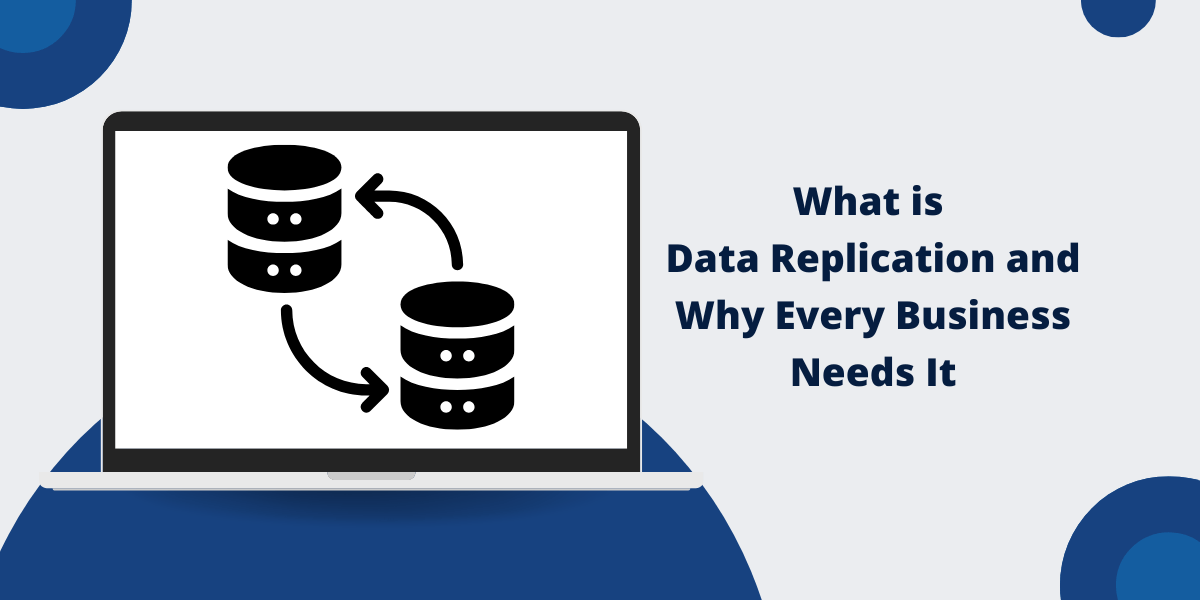In this data-driven world, businesses are fueling their decisions and operations with the mincing infrastructure of various connected pieces to deliver services that should bridge the gap between what customers want and what they get. However, as the data continues to grow and uptime becomes ever more vital, businesses should take additional steps to protect their data in terms of security and availability. And that is where data replication becomes relevant.
If data replication is a portion of your IT strategy, then understanding all those things can inculcate an understanding of how important they are. This article explains data replication, its benefits, and the fact that every business needs automated data replication to flourish within an ever-more-digital world.
What Is Data Replication?
So, what is data replication? Essentially it involves duplicating data from one database or storage system to another in time or close to real time scenarios. Its main goal is to ensure that identical copies of the data are stored in locations; whether within the data center or spread across multiple centers or even different sites in various countries. These replicated copies serve purposes, like disaster recovery measures, enabling availability and enhancing overall performance.
Data replication is the process of transferring data from sources, like databases and applications to backup storage systems for tasks such, as data backup and fault tolerance.
There are two main types of data replication:
- Synchronous Replication
- Asynchronous Replication
Synchronous Replication
When synchronous replication is used in data storage systems writes occur at the secondary locations simultaneously. This ensures that all copies of the data remain consistent and, up to date. However the effectiveness of this method relies on the quality and speed of the network as any delays, in connection can impact performance negatively.
Asynchronous Replication
In this scenario information is initially transmitted to the site before being duplicated at the site with a slight delay. While this helps reduce network resource utilization and enhance performance it can result in discrepancies, between the secondary copies especially when the data is frequently accessed.
Why Every Business Needs Data Replication
Businesses, in sectors benefit greatly from data replication as it offers advantages that are crucial, for the success of your business:
- Disaster Recovery and Business Continuity
- High Availability and Reduced Downtime
- Improved Performance and Load Balancing
- Data Protection and Backup
- Scalability and Flexibility
- Regulatory Compliance and Data Availability
- Cost-Efficiency and Risk Mitigation
Disaster Recovery and Business Continuity
Disaster recovery through data replication is one key purpose of this. Natural disasters, hardware failures, cyberattacks, or even human error can cause data loss due to corruption disrupting business processes.
Using data replication, companies can take a copy of mission-critical data and pack it in place other than the primary storage location in real-time. This means that, in the case of a failure, the replicated data is almost immediately accessible, increasing uptime and helping to avoid significant disruptions to operations.
High Availability and Reduced Downtime
Having downtime can result in losses. Harm your brands reputation significantly. Copying data is essential, for ensuring availability—ensuring that systems and data remain operational with interruptions.
During data replication processes are put in place by organizations to enable systems that redirect traffic to a data location when the primary system is unavailable, due to an outage This guarantees that applications and services remain accessible, to customers even when the main system experiences downtime.
For instance online shopping platforms should be 24/7. In case a server experiences downtime, for maintenance or hardware related problems they can seamlessly transition to their replicated system to ensure service, for customers making purchases.
Improved Performance and Load Balancing
Copying data is crucial not, for ensuring system reliability but for boosting overall performance efficiency by distributing the workload evenly among multiple data copies – a key aspect, for handling high volume tasks and various data operations.
Duplicating information, across sites helps reduce the burden on a solo server or database and enables businesses to distribute tasks evenly while enhancing response times and overall system effectiveness – a valuable practice for cloud based applications and internet services or organizations, with significant user engagement or web traffic.
Data Protection and Backup
As critical as data backups are for preventing the loss of important business information, replication is also one such step ahead. Replication enables companies to maintain live and updated copies of their data, which they can access immediately when any incident of data loss or corruption arises.
Since replicated data is continuously updated, it is instantly available (unlike traditional backups, which may take hours to restore). This drastically decreases the recovery time objectives (RTO) and Recovery point objectives (RPO), key metrics for business continuity.
For instance, if a file system is corrupted or a database is deleted, lost data can be restored using the replicated copy quickly to reduce downtime and operational impact.
Scalability and Flexibility
Data replication enables you to expand your infrastructure as needed over time effectively by producing copies of data without disrupting operations. This capability proves valuable, in settings where organizations swiftly generate new data replicas in various locations to accommodate a growing demand.
For instance a startup that begins with a database server would eventually require cloud server instances as it expands. By replicating the data the company can easily expand its infrastructure to handle workloads without having to revamp its systems from scratch.
Regulatory Compliance and Data Availability
Numerous sectors are required to adhere to rules regarding the storage, accessibility and safeguarding of data. These mandates may necessitate companies to retain types of information ensuring that it is easily accessible, for audits or regulatory inspections.
Replicating data can greatly simplify compliance with regulations, for businesses by storing data at various important locations, across different regions to meet local storage and privacy requirements.
For example a healthcare institution might need to maintain records using systems to comply with HIPAA or other regulations. Copying this information to servers or cloud platforms enables the institution to adhere to requirements while ensuring access, to patient records is maintained.
Cost-Efficiency and Risk Mitigation
Data replication is cost-effective despite the upfront investment in infrastructure or cloud services required for implementation because it mitigates risks associated with data loss, downtime, or system failures. The price of business disruption, damage to customer trust, and data recovery is far higher than the cost of setting up a solid data replication strategy.
When companies duplicate information, they avoid the expensive costs of choosing an information breach, assistance interruption, or compliance penalty—cost savings that develop over time and also enhance operational stability.
Final Thoughts
With data becoming the lifeblood of every business in a digital environment, data replication is the safety net that allows every organization to ensure uptime, prevent the loss of valuable information, and operate their businesses without disruption.
Data replication brings many advantages, ranging from disaster recovery and business continuity to increased performance and scalability, to name a few. Companies can safeguard against system failures, meet compliance mandates, and grow efficiently without needing to scale their resources up as they have multiple copies of critical data in real-time or near-real-time.
Regardless of the spectrum or industry your business falls in, a data replication strategy has become a non-negotiable matter for remaining relevant, minimizing risks, and keeping up with future-proofing your essential data infrastructure.

Priya Mervana
 Verified Web Security Experts
Verified Web Security Experts
Priya Mervana is working at SSLInsights.com as a web security expert with over 10 years of experience writing about encryption, SSL certificates, and online privacy. She aims to make complex security topics easily understandable for everyday internet users.
Stay Secure with SSLInsights!
Subscribe to get the latest insights on SSL security, website protection tips, and exclusive updates.
✅ Expert SSL guides
✅ Security alerts & updates
✅ Exclusive offers



